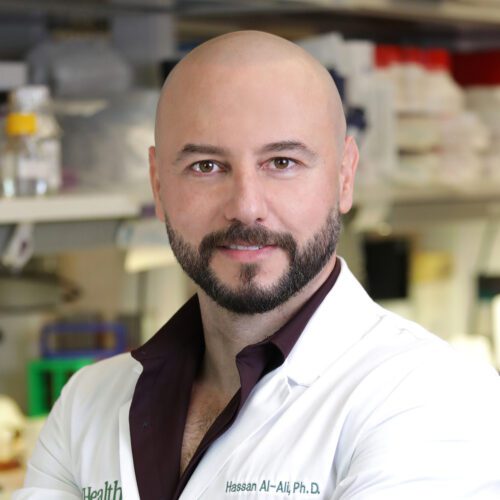Hassan A Ali, Ph.D., M.S.M.
Associate Professor, Department of Neurological Surgery and Medicine

The Miami Project to Cure Paralysis
1095 NW 14th Terrace (R-48)
Miami, FL 33136
Biography
Research Interests
Areas Of Research
Publications
More
Hassan is an Associate Professor (tenure-track) of Neurological Surgery and Medicine at the University of Miami (UM), and Director of High Content Screening Core for Phenotypic Drug Discovery. He is a member of The Miami Project to Cure Paralysis, the Katz Drug Discovery Center, and the Sylvester Comprehensive Cancer Center.
Hassan’s primary research interest is understanding the role of kinases in the proper functioning of the central nervous system (CNS), and utilizing this knowledge to develop therapeutics that repair CNS damage (caused by injury or neurodegenerative disease). In addition to this, Hassan is active in the areas of nephrology and oncology.
He also has pet interest in the subjects of personalized cancer therapy, aging, and regenerative medicine, which he pursues with collaborators within and outside UM.
Understanding the signaling pathways that regulate axon growth, and identifying components of those pathways that can be targeted with drugs to induce robust axon regeneration
My research at The Miami Project to Cure Paralysis focuses on understanding the signaling pathways that regulate axon growth, and identifying components of those pathways that can be targeted with drugs to induce robust axon regeneration. Central nervous system (CNS) neurons lack the ability to regenerate their axons, which substantially hampers functional recovery from CNS injuries. The etiology of the problem is complex and mediated by multiple signaling pathways. This necessitates engaging more than one drug target to achieve clinically significant regeneration. However, identifying just one target is difficult, and finding a single drug that engages multiple targets is even more challenging. My laboratory uses three main strategies for solving this complex problem:
1. Phenotypic screening: Phenotypic screening is a powerful technique that combines robotics, automated microscopy, and sophisticated image analysis algorithms. It allows us to test live neurons with thousands of compounds and acquire very detailed information on how each individual chemical affects the behavior of the neurons.
2. Target-based screening: Target-based screening is a high throughput technology that makes it possible to test hundreds of gene products (targets) with hundreds of thousands of compounds to efficiently determine how each compound modulates the biochemical activity of each target. One very important group of drug targets is the family of kinases. Kinases control almost every function of the cell, and therefor can be targeted to alter most cellular phenotypes, including axon growth. Another advantage of using kinases is that their similarity makes it possible to target more than one of them with just one molecule.
3. Machine learning: Machine learning leverages the tremendous power of high performance computing to identify solutions to problems that are too complex to be solved using explicit mathematics. We phenotypically screen kinase inhibitors with CNS neurons to identify ones that promote axon growth in those cells. Then, we use target-based profiling to determine which kinases each of the compounds inhibits. Finally, we use machine learning to relate the two types of data and identify highly effective drug targets. This in turn allows us to discover or develop compounds that are likely to have high clinical efficacy.
Using these approaches, we have identified several promising drug targets for promoting axon regeneration. We also identified a number of molecules that co-engage multiple targets and strongly promote axon regeneration in animal models of spinal cord injury (SCI). We are developing these molecules into potential therapies for rebuilding damaged neural networks and promoting functional recovery from traumatic SCI.
In addition to my work on CNS regeneration, I’m also interested in cancer drug discovery. Kinases play a central role in cancer, and are therefore an intensely pursued drug target family in oncology. The combinatorial approaches developed by my lab provide an infrastructure for oncology drug discovery and personalized cancer medicine. By directly querying the functional state of cells, our methods complement genomic technologies such as exome sequencing and next generation RNA sequencing, which query the “blueprint” of cells. I collaborate with several oncology groups to discover drugs for a number of cancers including sarcoma, lymphoma, leukemia, and breast cancer.
Visit Dr. Ali’s Publication Listing
News Stories
NIH/NINDS Blueprint Neurotherapeutics Network Grant (April 2022)
Kinase Discovered that Targets Neuroprotection and Regeneration (December 2020)
On the Edge of Discovery (December 2019)
Turbo Charging Discovery with High-Content Screening (September 2019)
Faculty Spotlight (July 2019)
Miami Project Researchers Launch Startup Truvitech (March 2018)
Industry and Academia: Drs. John Bixby, Vance Lemmon and Hassan Al-Ali (October 2016)
PROFESSIONAL AFFILIATIONS/MEMBERSHIPS
| 2022 – | Member, Neurological Sciences and Disorders A Study Section (NSD), NINDS/NIH |
| 2022 – | Member, Scientific Peer Advisory and Review Services (SPARS) division of the American Institute of Biological Sciences (AIBS) |
| 2021 – | Ad hoc grant reviewer, US Army Department of Defense (USAMRAA) |
| 2018 – | Member, American Society of Nephrology |
| 2018 – | Grant reviewer, Cancer Research Society |
| 2017 – 2018 | Scientific Consultant, Promega, Inc. |
| 2017 – | Member, Society for Neuroscience |
| 2017 – | Member, Sylvester Comprehensive Cancer Center, University of Miami, Miami, FL |
| 2017 – | Member, Advisory Board, Strategic Partnerships for Drug Repurposing Forum |
| 2016 – | Scientific Advisory Board Member, Chemical Probes Portal |
| 2016 – 2022 | Co-Founder, Truvitech, LLC |
| 2016 – 2022 | Chief Scientific Officer, Truvitech, LLC |
| 2013 – | Member, Society of Laboratory Automation and Screening |
| 2011 – 2012 | Member, International Chemical Biology Society |
| 2008 – | Member, American Chemical Society |
